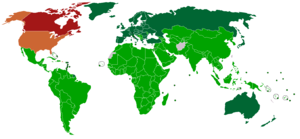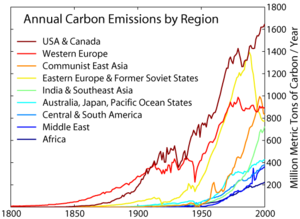Review: A
Critique on Canada's Withdrawal from the Kyoto Protocol
If Canada should be praised for its climate change efforts, it's definitely not something we can make out in the map above. Prior to 2011, Canada proudly boasted its green status in that map, but now it has shamefully drifted into brown zone, which is not a good thing if you consider Canada's size and what we usually associate the color brown with- it's kind of hard to miss, eh?
Well, when Minister of Environment Canada, Peter Kent, announced that we've officially withdrawn from the Kyoto Protocol last year, let's just say people weren't exactly too happy or too proud about the news. The Kyoto Protocol, joining 194 developed nations together in consent to negotiate on ways to reduce CO2 emissions into our planet's atmosphere, is a historic milestone. It is the first and only international agreement that obliges nations to respect target rates of green house gas emissions into the atmosphere. It's basically one of the most important commitments a developed nation could commit to in its fight against climate change, and Canada, the alleged "pro-green nation", was the first nation to ever withdraw from it after only six years of quasi-contribution. Why, oh Canada, why?
According to Kent, committing to Kyoto was just too expensive for Canada. Withdrawing would save the Conservative government $ 14 billion in penalties (CBC News). The Kyoto protocol committed major Canadian industries to reduce their annual CO2 emissions to below 1990 levels while financially supporting developing nations so that they may follow suit eventually. Canada had till the end of 2011 to agree on a withdrawal or to face additional cuts.
So if the Conservative government of Canada, alongside the Ministry of Environment, insist that the withdrawal was strictly financial, then we should trust them, right?
Not necessarily. Critics and environmentalists have a hard time believing Canada's motives, claiming the cost to staying in Kyoto is "absolutely" made up (NDP Environment critic Megan Leslie).In his letter to Canadian Prime Minister Stephen Harper, Mike Hudema, a representative of Greenpeace Canada, wrote, "The Harper government has imposed a death sentence on many of the world's most vulnerable populations by pulling out of Kyoto."Tim Gore, international climate change advisor for Oxfam, also criticized Canada's decision:"Canada's exit from the Kyoto Protocol, the one existing agreement that legally binds some countries to emission cuts targets, is an affront to the nearly 1 billion people who struggle every day to feed their families in the face of increasingly frequent and severe droughts, floods, heat waves and storms."
"Withdrawing from the Kyoto Protocol is a reckless and totally irresponsible act", said Greenpeace when Canada pulled out of Kyoto. Who can disagree with what the critics say, it's no secret that Canada selfishly pulled out to save its own pants.
What bothers me the most in this is that the Stephen Harper government blamed the previous liberal government for signing the Kyoto Protocol claiming it wasn't well prepared for the commitments Kyoto entailed. Critics would agree with me when I say it was Canada's international duty to sign the Kyoto Protocol as we are amongst the top 5 pollutant nations who emit the most carbon dioxide and green house gases into the earth's atmosphere. Signing an international agreement on the environment and abiding by its requirements is the least we can do in our fight against global warming.
But no siree, the Canadian government turned its back on Kyoto and said it had a better, more suitable alternative to reduce CO2 emissions. The plan includes reducing emissions to 3 % below 1990 levels by the year 2020. However, scientists and critics disproved this as a good reduction plan because science-based targets for avoiding dangerous levels of global warming necessitate reducing emissions to 25 % below 1990 levels. It looks as though Canada is having a bit of a calculation problem.
Peter Kent's defense was that Kyoto would never work because China and the U.S weren't committed, and they're the world's biggest pollutants. Well Kent, way to go quitting on the rest of the globe and certainly not setting an example for China and the U.S. The government defends itself by saying Canada is doing its best as a proactive environment-friendly nation. Oh, please. Let's see, should we start discussing the tar sands in Athabasca, Alberta and the tons of toxins it emits on a daily basis, or should we just go straight into the slaughtering of seals in New Foundland and Nova Scotia? The thing is that Canada, as a developed country, is not doing half the work it should be doing for the environment.
Withdrawing from Kyoto is just another way of making more profit within Canada and keeping it within Canada instead of spending it on nations that are in need of it, which is what Kyoto is eventually all about. Let's just say the tiny island of Tuvalu that faces rising sea levels on a daily basis was not too happy to hear that the second largest country in the world withdrew from a commitment that would save their island from catastrophe.
Many other nations roundly criticized Canada's decision- some of them have already begun creating technologies to reduce emissions even more rapidly than Kyoto requires of them. Canada's back step definitely discouraged the advancements of other nations who are equipped with a lot less resources than Canada is.
Ultimately, Gore said it best: "If Canada is not willing (to commit to Kyoto), it should step aside and at least not harm efforts of those who want to move forward."




Leave a comment